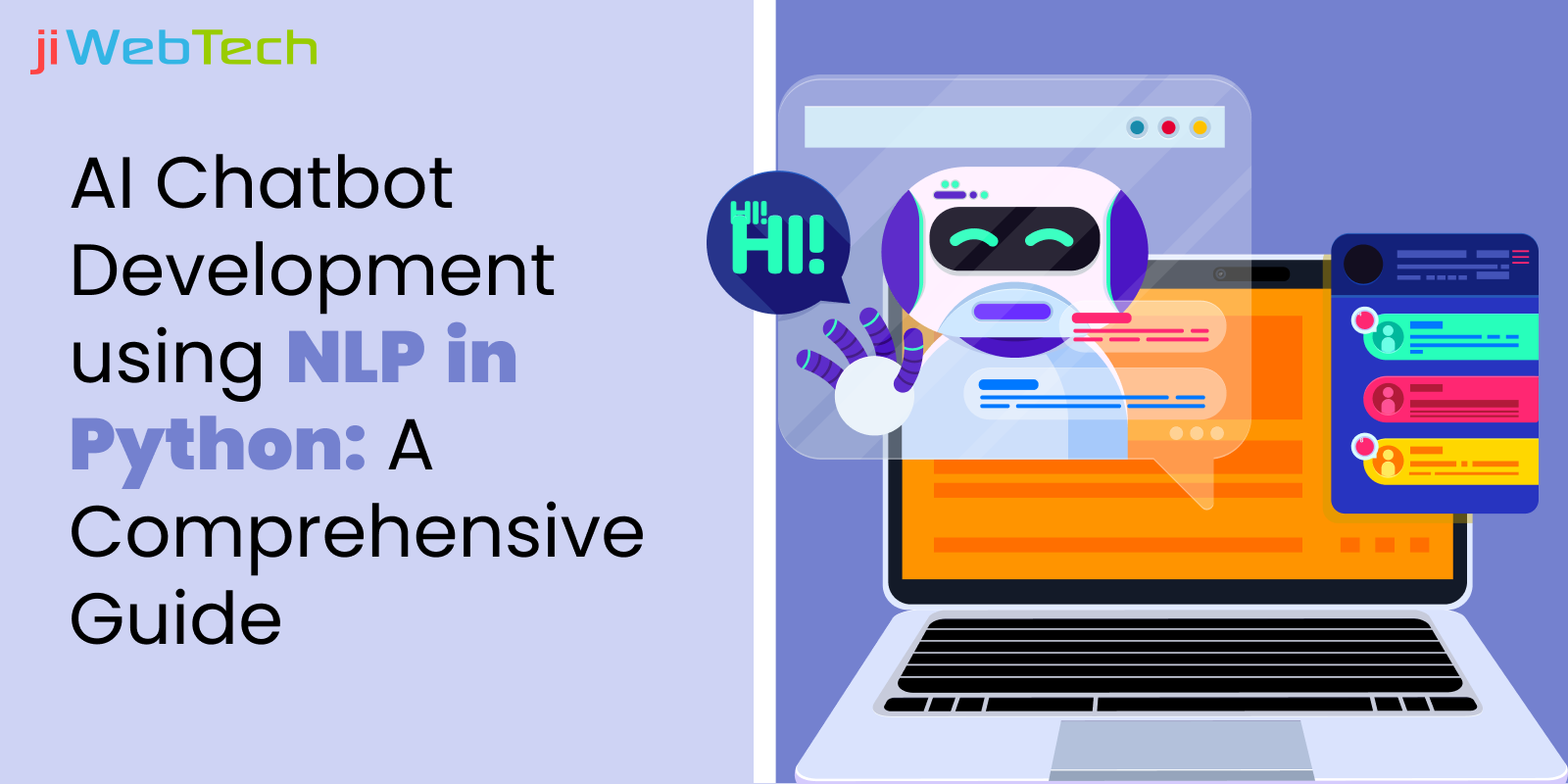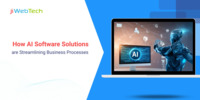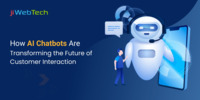- Sep 18, 2025
- Generative Ai
- 3710
Share this post on:

Businesses are moving towards developing AI-based chatbots to enhance their revenue. But what is a chatbot? How do chatbots help businesses grow? Why is AI chatbot development crucial? Why should developers build chatbots using Python? How does Natural Language Processing (NLP) help businesses develop chatbots?
Even though there are a lot of languages that can be used to design and develop chatbots, Python is considered the top player and a go-to programming language for AI chatbot development. It is due to its simplicity, readability, and extensive library support for NLP and machine learning tasks.
Libraries like NLTK (Natural Language Toolkit), spaCy, and Hugging Face Transformers provide powerful tools for text preprocessing, feature extraction, and model training, making it easier to develop and deploy chatbots. Now, that we have discussed why Python is a go-to language for AI chatbot developers, let us dive deep into the blog and understand AI chatbot development in more detail.
What is AI Chatbot Development?
Chatbots, or conversational agents, are computer programs designed to simulate human-like conversations through text or voice interfaces. They have become increasingly popular in recent years, driven by advancements in natural language processing (NLP) and machine learning technologies. AI chatbot development aims to create intelligent virtual assistants capable of understanding and responding to human queries naturally and contextually.
At its core, an AI chatbot uses NLP techniques to analyze and interpret user inputs, extract relevant information, and generate appropriate responses. NLP involves various tasks such as tokenization, stemming, part-of-speech tagging, named entity recognition, and intent classification. These processes enable the chatbot to understand the user's intent, sentiment, and context, enabling it to provide relevant and personalized responses.
Understanding Natural Language Processing (NLP) and its Role in Chatbot Development
Natural Language Processing (NLP) is a branch of Artificial Intelligence that focuses on enabling machines to understand, interpret, and generate human language. It plays a crucial role in chatbot development by enabling the bot to comprehend user inputs, extract relevant information, and formulate responses accordingly. NLP involves several techniques and algorithms, including:
- Tokenization: Breaking down text into smaller units (tokens) such as words, phrases, or sentences.
- Part-of-Speech (POS) Tagging: Identifying the grammatical role of each word in a sentence (noun, verb, adjective, etc.).
- Named Entity Recognition (NER): Identifying and classifying named entities like people, organizations, locations, etc.
- Sentiment Analysis: Determining the emotional tone or sentiment behind a given text.
- Intent Classification: Identifying the user's intent or goal behind a query.
- Entity Extraction: Extracting relevant entities (e.g., dates, locations, product names) from user inputs.
- Response Generation: Formulating appropriate responses based on the user's input and the chatbot's knowledge base.
Step-by-Step Guide to Develop a Chatbot using NLP and Python
Building an AI chatbot using NLP in Python involves several steps, including data preparation, model training, and deployment. Here's a comprehensive guide to help you get started:
Define the Chatbot's Purpose and Domain:
Before diving into development, it's crucial to clearly define the chatbot's purpose and the domain in which it will operate. This will help determine the required knowledge base, conversation flow, and potential use cases.
Data Collection and Preprocessing:
Collect a diverse set of conversational data relevant to the chatbot's domain. This data can include frequently asked questions, common queries, and sample dialogues. Preprocess the data by removing noise, handling text normalization, and formatting it for efficient processing.
Text Preprocessing and Feature Extraction:
Use NLP libraries in Python to preprocess the text data. This may involve tokenization, stop word removal, stemming or lemmatization, and part-of-speech tagging. Extract relevant features from the preprocessed text, such as bag-of-words, TF-IDF, or word embeddings, which will be used for training the chatbot model.
Intent Classification and Entity Recognition:
Implement intent classification to determine the user's goal or intent behind the query. This can be achieved using machine learning algorithms like logistic regression, decision trees, or deep learning models like recurrent neural networks (RNNs) or transformers. Additionally, incorporate named entity recognition (NER) to identify and extract relevant entities (e.g., names, locations, dates) from the user input.
Response Generation:
Develop a response generation module that maps the identified intents and entities to appropriate responses. This can be achieved using rule-based approaches (e.g., pattern matching, templates) or generative models like sequence-to-sequence (seq2seq) models or retrieval-based methods.
Context Management:
Implement context management to maintain the conversational state and ensure coherent and relevant responses based on the conversation history. This can involve tracking user preferences, previous queries, and relevant context variables.
Model Training and Evaluation:
Split the preprocessed data into training and testing sets. Train the chatbot model using the selected algorithms and techniques. Evaluate the model's performance using appropriate metrics such as accuracy, F1-score, or perplexity, depending on the task.
Integration and Deployment:
Integrate the trained chatbot model with a user interface (e.g., web application, mobile app, or messaging platform) for user interaction. Deploy the chatbot on a suitable platform or infrastructure, ensuring scalability and reliability.
Continuous Improvement:
Monitor the chatbot's performance in real-world scenarios and gather user feedback. Continuously update the knowledge base, refine the model, and incorporate new conversational data to enhance the chatbot's capabilities over time.
JiWebTech: Empowering Businesses with AI-based Chatbots
JiWebTech, a leading mobile app development company, recognizes the potential of AI chatbots in enhancing customer experiences and streamlining business operations. With a team of experienced developers and AI experts, we assist businesses in designing, developing, and deploying cutting-edge AI-based chatbots tailored to their specific needs.
We leverage the latest NLP techniques, machine learning algorithms, and Python frameworks to create intelligent and conversational chatbots. Our chatbot development solutions can be integrated with various platforms, including websites, mobile apps, messaging platforms, and voice assistants, ensuring seamless communication with customers across multiple touchpoints. Invest in our software app development solutions and benefit from:
- Personalized Customer Experiences: We develop chatbots that can engage in natural language conversations, understand customer queries, and provide personalized responses, enhancing overall customer satisfaction.
- Efficient Automation: AI-based chatbots can automate routine tasks, such as answering frequently asked questions, providing product recommendations, and handling simple transactions, freeing up human resources for more complex tasks.
- 24/7 Availability: Chatbots developed by our AI expert developers provide round-the-clock support, ensuring customers receive prompt assistance regardless of time or location.
- Scalability: Our AI-based chatbot solutions are designed to be scalable, allowing businesses to handle increasing customer volumes without significant additional costs.
By harnessing the power of AI, NLP, and Python, JiWebTech empowers businesses to stay ahead of the curve and deliver exceptional customer experiences through intelligent and conversational chatbots.
Wrapping up:
AI chatbot development using Python is a journey that combines the power of AI and NLP. Chatbot development using NLP in Python offers businesses a powerful solution to enhance customer engagement, streamline operations, and gain a competitive edge. Whether it is customer support or personalized recommendations, AI Chatbots play a crucial role in reshaping the future of businesses. Hence, by following the steps outlined above, and partnering with a reputable company like JiWebTech businesses can unlock the full potential of AI-based chatbots and reap the benefits of this transformative technology. Contact us today, and embark on the journey of AI-based chatbots with Python.









